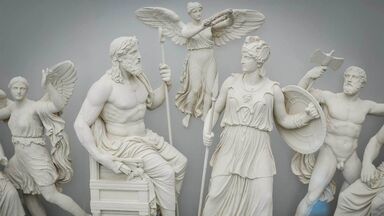Demeter Definition
dĭ-mētər
noun
The goddess of agriculture and fertility: identified with the Roman Ceres.
Webster's New World
The goddess of the harvest, daughter of Rhea and Cronus and mother of Persephone.
American Heritage
pronoun
(Greek mythology) The goddess of the fertility of the Earth and harvests, protector of marriage and social order; daughter of Cronos and Rhea, mother to Persephone.
Wiktionary
Origin of Demeter
From Ancient Greek Δημήτηρ (Dēmētēr), from γῆ (gē) + μήτηρ (mētēr).
From Wiktionary
-
Greek Dēmētēr māter- in Indo-European roots
From American Heritage Dictionary of the English Language, 5th Edition
Related Articles
Find Similar Words
Find similar words to Demeter using the buttons below.
